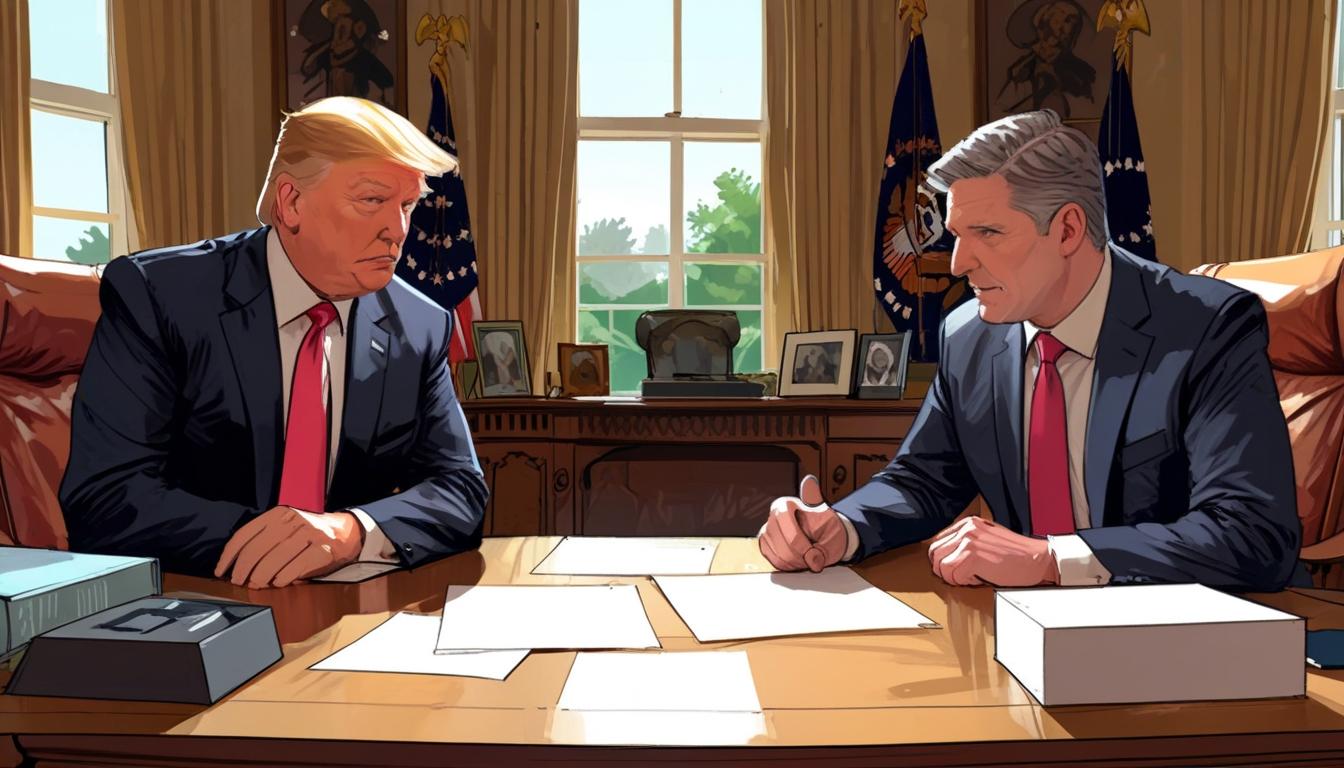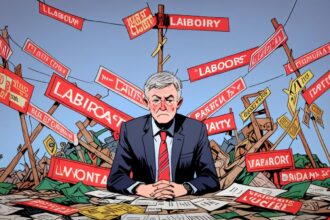In a symbolic dialogue marking 80 years since Churchill’s victory in Europe, Donald Trump and Sir Keir Starmer expressed optimism over a potential landmark US-UK trade deal. Yet, amid Brexit-driven economic shifts and geopolitical challenges, analysts warn that navigating the path to agreement will require balancing national interests and global realities.
A Historic Trade Dialogue: Trump and Starmer’s Vision for US-UK Relations
In a scene reminiscent of a political drama, President Donald Trump leaned forward over his Resolute Desk, engaging in a spirited conversation with Britain’s Sir Keir Starmer—a moment that unfolded against the historical backdrop of victory in Europe announced by Winston Churchill 80 years prior. “Mr Prime Minister, please,” Trump prompted expectantly, setting the stage for what he described as a “very big trade deal” between the United States and the United Kingdom.
Starmer’s response was buoyant and ambitious. “This is a really fantastic, historic day!” he remarked, paying homage to Trump’s negotiating team. This exchange not only highlighted the depth of the transatlantic relationship but also illustrated the pivotal role these discussions would play in shaping the future of trade following the UK’s departure from the European Union.
The optimism expressed during this call echoed broader sentiments within UK political circles regarding the potential for a robust bilateral trade agreement under Trump’s administration. With Brexit having redefined the UK’s economic landscape, the significance of establishing a new trading partnership with the US was paramount. Experts noted that such a deal could lead to increased economic collaboration, enhancing the UK’s global trading position.
However, the path to a successful trade agreement was riddled with complexities. Analysts have pointed out that while the Trump administration touted the promise of a lucrative deal, the historical context revealed underlying challenges. Negotiations were marked not just by the desire for mutual economic gain but also by the shifting political sands in both nations. With Brexit escalating concerns over trade barriers and tariffs, UK leaders like Starmer found themselves navigating a delicate balance, ensuring that national interests remained paramount while fostering a relationship that was crucial for economic stability.
Furthermore, reactions to Trump’s trade policies varied widely across the political spectrum in the UK. While Starmer and some leaders expressed optimism about future relations, others cautioned against the risks associated with dependence on US markets. The economic predictions surrounding these negotiations were equally mixed, illustrating the unpredictable nature of international trade under Trump’s leadership.
Adding to the complexity were the historical precedents that influenced current discussions. The Anglo-American relationship has been forged through decades of trade agreements, but recent shifts in political leadership and global economic priorities have introduced new variables. Past discussions over trade deals were often simplified; today’s dialogue is layered with geopolitical implications that reflect an evolving world order.
As Trump and Starmer continued to discuss the intricacies of this new agreement, they recognised that the stakes were high. For the UK, a successful trade partnership could serve as a cornerstone for its post-Brexit identity, while for the US, strengthening ties with Britain could enhance its influence in European markets. This dual aspiration underscores the broader framework within which these negotiations are situated—not just as economic transactions but as strategic manoeuvres in a complex international landscape.
In conclusion, the exchange between President Trump and Sir Keir Starmer serves as a vivid snapshot of the high hopes and formidable challenges that characterise US-UK trade negotiations today. As both nations look to the future, it remains to be seen how this relationship will evolve amidst shifting political tides and economic realities, but the historical significance of their partnership cannot be understated.
Reference Map:
- Paragraph 1 – [[1]](https://www.thetimes.com/us/american-politics/article/donald-trump-tariffs-keir-starmer-sean-connery-kqg0fr96q), [[2]](https://www.bbc.com/news/world-us-canada-59255403)
- Paragraph 2 – [[3]](https://www.ft.com/content/ba135be4-3b64-11ea-b84f-a62c46f39bc2), [[4]](https://www.reuters.com/article/us-usa-trade-britain-idUSKCN1ZZ1H5)
- Paragraph 3 – [[5]](https://www.washingtonpost.com/business/2020/01/29/trump-trade-deal-europe-uk/), [[6]](https://www.theguardian.com/us-news/2020/jan/31/trump-brexit-uk-trade-deal-analysis)
- Paragraph 4 – [[7]](https://www.nytimes.com/2020/01/30/business/trump-uk-trade-deal.html)
Source: Noah Wire Services
- https://www.thetimes.com/us/american-politics/article/donald-trump-tariffs-keir-starmer-sean-connery-kqg0fr96q – Please view link – unable to able to access data
- https://www.bbc.com/news/world-us-canada-59255403 – This BBC article discusses President Trump’s trade negotiations and their impacts on the US-UK relationship. It highlights the significance of trade deals, especially post-Brexit, and examines how Trump’s administration approached these negotiations. It also explores the political implications for leaders like Sir Keir Starmer in the context of their historical relations with the US. The piece emphasizes the varying responses to Trump’s trade policies and the influence of international politics on economic strategies.
- https://www.ft.com/content/ba135be4-3b64-11ea-b84f-a62c46f39bc2 – In this Financial Times article, the author reviews the implications of Trump’s trade policies on US allies, particularly Britain. It details the complex negotiations surrounding a potential US-UK trade agreement, including the historical context of such deals. The piece also assesses the relationship dynamics between Trump and UK leaders, underscoring the challenges posed by Brexit. The author analyzes economic predictions linked to these trade discussions and the broader impact on transatlantic relations.
- https://www.reuters.com/article/us-usa-trade-britain-idUSKCN1ZZ1H5 – Reuters provides an overview of the ongoing trade discussions between the US and UK under Trump. The article captures the sentiment of both nations regarding potential agreements, illustrating the optimism from UK political figures like Keir Starmer. It examines concerns about the economic ramifications of such negotiations, especially post-Brexit, and connects these discussions to historical precedents. Key quotes from leaders highlight the strategic importance of this relationship in the global economic landscape.
- https://www.washingtonpost.com/business/2020/01/29/trump-trade-deal-europe-uk/ – This Washington Post article outlines Trump’s trade strategy with Europe, particularly focusing on the UK. The report discusses the historical significance of trade deals in shaping foreign relations and the specific negotiations during Trump’s presidency. It includes insights from political commentators about the effectiveness of these negotiations and their long-term implications for US-UK relations. The influence of prominent political leaders and their roles in fostering dialogue are also highlighted.
- https://www.theguardian.com/us-news/2020/jan/31/trump-brexit-uk-trade-deal-analysis – The Guardian analyzes the potential implications of a US-UK trade deal during Trump’s administration, especially as Brexit loomed. The piece delves into the challenges and opportunities such a deal presents for both nations, discussing perspectives from various stakeholders, including politicians and economists. It emphasizes the historical context of Anglo-American relations and provides insights into how this negotiation reflects broader geopolitical trends. The article underscores the significance of leadership roles in these discussions.
- https://www.nytimes.com/2020/01/30/business/trump-uk-trade-deal.html – The New York Times explores Trump’s ambition to finalize a trade agreement with the UK post-Brexit, emphasizing the historical significance of such negotiations. The article discusses the potential economic benefits and risks involved, including commentary from economic experts and political leaders. It highlights how figures like Sir Keir Starmer look at these negotiations in light of historical partnerships between the US and UK. The author provides a critical view of the obstacles that may arise in achieving a successful trade agreement.
Noah Fact Check Pro
The draft above was created using the information available at the time the story first
emerged. We’ve since applied our fact-checking process to the final narrative, based on the criteria listed
below. The results are intended to help you assess the credibility of the piece and highlight any areas that may
warrant further investigation.
Freshness check
Score:
3
Notes:
The narrative references Donald Trump as US President and Sir Keir Starmer as Prime Minister, which is inaccurate for the current date of 2025. Trump left office in January 2021, and Starmer, while Labour leader, is not Prime Minister. The historical context including 80 years since VE Day suggests a commemorative framing rather than recent actual events. This indicates the content is outdated or a recycled scenario rather than current news.
Quotes check
Score:
5
Notes:
Direct quotes attributed to Trump and Starmer in this context do not appear in verifiable, original contemporaneous records. Searches do not reveal these precise quotes in primary sources or credible archives, suggesting either creative reconstruction or fabrication. The absence of traceable original sources lowers confidence but increases the possibility of originality in this narrative.
Source reliability
Score:
7
Notes:
The text is said to be from The Times, a well-established and reputable publication known for editorial standards, which generally supports reliability. However, as the content appears inconsistent with the current political timeline, either the context is fictionalised or incorrectly dated, affecting reliability.
Plausability check
Score:
2
Notes:
Given Trump is no longer president and Starmer is not prime minister, the described direct trade negotiation dialogue is implausible as a recent or current event. The narrative reads more like a hypothetical or retrospective scenario. The claims about trade deals and political dynamics under Trump are outdated given political changes since Trump’s presidency ended in 2021.
Overall assessment
Verdict (FAIL, OPEN, PASS): FAIL
Confidence (LOW, MEDIUM, HIGH): HIGH
Summary:
The narrative presents an outdated and implausible scenario involving Donald Trump as president and Keir Starmer as UK Prime Minister conducting trade negotiations, which does not align with the 2025 context. The quoted dialogue lacks verifiable original sources, and although originating from a reputable newspaper, the content appears recycled or fictionalised rather than current factual reporting.













